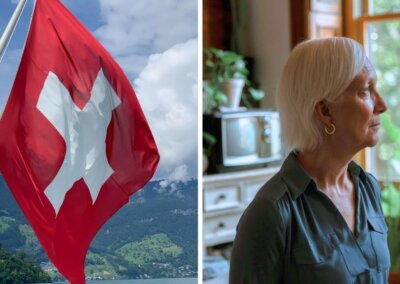An Irish family discovered via WhatsApp that their mother had secretly ended her life by assisted suicide in Switzerland and that her ashes would be posted to them, raising concerns that the same thing could happen in England and Wales if Kim Leadbeater’s assisted suicide Bill becomes law.
Maureen Slough, 58, from Cavan, Ireland, had told her family that she was going on holiday to Lithuania with a friend last month, but instead went to Swiss assisted suicide clinic, Pegasos, to end her life.
According to her daughter, Megan Royal, Maureen had a successful working life after being promoted to the role of executive officer in the civil service before retiring last year. Maureen’s partner, Mick Lynch, described her as being “full of life” after speaking to her on the day of the assisted suicide and had no idea of her plans to end her life. Megan explained that her mother had tried to take her own life last year after two of her sisters had died, believing she was not in her right mind when she decided to end her life in Switzerland.
Megan was reportedly horrified to learn of her mother’s death via a WhatsApp message sent by Pegasos, who told her that her mother’s ashes would be sent by post to her. Both Megan and Mick received “goodbye” letters, handwritten by Maureen, and sent from Switzerland, in the weeks after Maureen’s death.
Megan said “They should not have allowed her to make that decision on her own. This group did not contact me, even though my mother had nominated me as next of kin. They waited until afterwards and then told me she had died listening to an Elvis Presley song”.
“We got the WhatsApp message to say she had died”
Megan said that her mother paid Pegasos €15,000 and travelled alone to the clinic in Switzerland, saying “She had told us she was going to Lithuania, but she had confided in two people that she had other plans, and after a series of concerned phone calls she said she would come home, but then we got the WhatsApp message to say she had died”.
After the family queried Pegasos’s decision to go ahead without informing them, the Pegasos group said it had received a letter from Megan saying she was aware of her mother’s wishes and accepted them. Pegasos also said it verified the letter through an email response to Megan via an email address which Maureen had provided. Megan denies any contact with Pegasos, and the family believe Maureen may have forged the letter and then confirmed it through an email address she had herself created.
Swiss assisted suicide clinic faces “numerous criticisms”
Maureen Slough’s brother, Philip, a solicitor based in the UK, has written to the Foreign, Commonwealth and Development Office, urging them to investigate the matter with the Swiss authorities. In his letter, he said that Pegasos had failed to follow its own policy of informing family, adding “It appears my sister provided Pegasos with letters of complaint to medical authorities in Éire in respect of bogus medical conditions, and that these documents were considered by Pegasos in support of her application”.
“While I understand that Swiss law permits assisted dying, the Pegasos clinic has faced numerous criticisms in the UK for their practices with British nationals, and the circumstances in which my sister took her life are highly questionable”.
The law around assisted suicide in Switzerland, established in 1941, is broad. The Swiss Criminal Code only outlaws assisted suicide in Article 115 for “selfish motives”; it is permitted in all other circumstances.
Assisted suicide in secret
Pegasos was at the centre of a similar controversy earlier this year when a British mother, Anne, ended her life at the Pegasos assisted suicide clinic in Switzerland without informing her family.
As Kim Leadbeater’s Terminally Ill Adults (End of Life) Bill is considered in the House of Lords, both Maureen and Anne’s cases raise important questions about how families in the UK would respond to a loved one’s assisted suicide taking place in secret. With no requirement in the Bill to inform or involve family, there is nothing to prevent assisted suicides taking place in secret in England should it become law.
Nikki da Costa, former Director of Legislative Affairs at 10 Downing Street, expressed these sentiments in a post commenting on Anne’s case on X, saying “This is just like Kim [Leadbeater]’s Bill. NO mechanism for family to be told nor raise concerns either before the person’s life is ended or afterwards. Imagine being the parent of a terminally ill 18 year old and finding out afterwards your child chose this to relieve the burden on you?”.
The issue of assisted suicides taking place in secret was addressed when Danny Kruger MP tabled an amendment (418a) that would have required that the person seeking an assisted suicide sign a declaration saying they have or have not informed their family of their decision. It was not selected for debate at Third Reading.
Speaking on this matter during the debate, Kruger said “That is the saddest thing, which was hinted at quite strongly – in fact, stated explicitly – in some of the evidence sessions. It has been suggested that wanting a loved one to live is seen by doctors as a form of coercion that should be resisted; that trying to argue a loved one out of an assisted death is the coercion that we need to guard against and, on that basis, we should not be making any expectation that families are informed. What a tragic thing for us to say. To enable doctors to issue lethal drugs that kill people without their family knowing is an absolutely tragic thing. I beg the Committee to consider what on earth we are doing allowing that”.
Spokesperson for Right To Life UK, Catherine Robinson, said “This appalling story is a taste of what could, and very likely will, happen if Kim Leadbeater’s assisted suicide Bill becomes law in England and Wales. The Bill currently under discussion does not require that family be involved in the decision to end one’s life via assisted suicide at any stage. The proposed law would allow precisely what has happened in both Maureen’s and Anne’s cases”.
“It is precisely those in the best position to provide support in living, the family, who are not required to be involved at any stage and who may only find out about the death of a loved one after it has already happened”.
“This is completely unacceptable. It must not happen, and it is a further reason why we will be fighting this Bill at every stage in the House of Lords, where we are confident it can be overturned given its continued loss of support”.
“It is essential that this reckless Bill is stopped in its tracks in order to prevent tens of thousands of lives from being put at risk in the years to come”.












